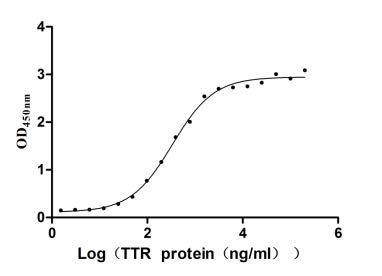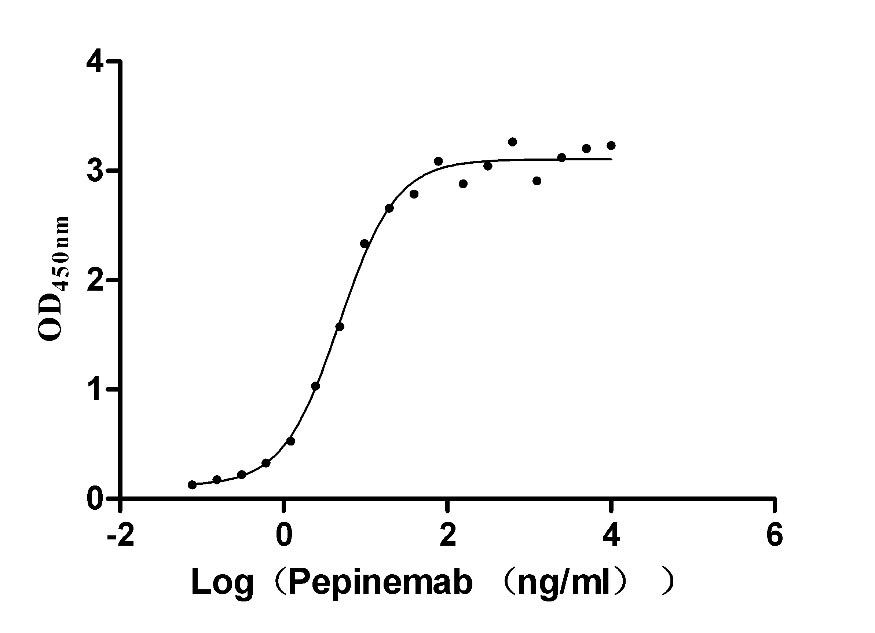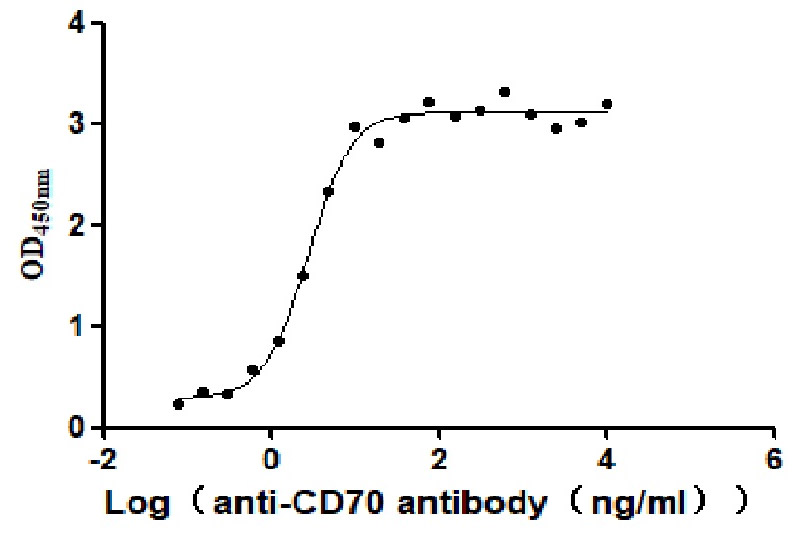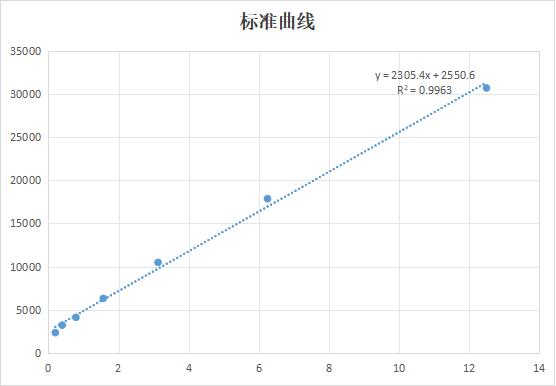Recombinant Mouse C-X-C chemokine receptor type 2 (Cxcr2), partial
-
货号:CSB-YP011673MO1
-
规格:
-
来源:Yeast
-
其他:
-
货号:CSB-EP011673MO1
-
规格:
-
来源:E.coli
-
其他:
-
货号:CSB-EP011673MO1-B
-
规格:
-
来源:E.coli
-
共轭:Avi-tag Biotinylated
E. coli biotin ligase (BirA) is highly specific in covalently attaching biotin to the 15 amino acid AviTag peptide. This recombinant protein was biotinylated in vivo by AviTag-BirA technology, which method is BriA catalyzes amide linkage between the biotin and the specific lysine of the AviTag.
-
其他:
-
货号:CSB-BP011673MO1
-
规格:
-
来源:Baculovirus
-
其他:
-
货号:CSB-MP011673MO1
-
规格:
-
来源:Mammalian cell
-
其他:
产品详情
-
纯度:>85% (SDS-PAGE)
-
基因名:
-
Uniprot No.:
-
别名:Cxcr2; Cmkar2; Gpcr16; Il8rb; C-X-C chemokine receptor type 2; CXC-R2; CXCR-2; GRO/MGSA receptor; High affinity interleukin-8 receptor B; IL-8R B; CD antigen CD182
-
种属:Mus musculus (Mouse)
-
蛋白长度:Partial
-
蛋白标签:Tag type will be determined during the manufacturing process.
The tag type will be determined during production process. If you have specified tag type, please tell us and we will develop the specified tag preferentially. -
产品提供形式:Lyophilized powder
Note: We will preferentially ship the format that we have in stock, however, if you have any special requirement for the format, please remark your requirement when placing the order, we will prepare according to your demand. -
复溶:We recommend that this vial be briefly centrifuged prior to opening to bring the contents to the bottom. Please reconstitute protein in deionized sterile water to a concentration of 0.1-1.0 mg/mL.We recommend to add 5-50% of glycerol (final concentration) and aliquot for long-term storage at -20℃/-80℃. Our default final concentration of glycerol is 50%. Customers could use it as reference.
-
储存条件:Store at -20°C/-80°C upon receipt, aliquoting is necessary for mutiple use. Avoid repeated freeze-thaw cycles.
-
保质期:The shelf life is related to many factors, storage state, buffer ingredients, storage temperature and the stability of the protein itself.
Generally, the shelf life of liquid form is 6 months at -20°C/-80°C. The shelf life of lyophilized form is 12 months at -20°C/-80°C. -
货期:Delivery time may differ from different purchasing way or location, please kindly consult your local distributors for specific delivery time.Note: All of our proteins are default shipped with normal blue ice packs, if you request to ship with dry ice, please communicate with us in advance and extra fees will be charged.
-
注意事项:Repeated freezing and thawing is not recommended. Store working aliquots at 4°C for up to one week.
-
Datasheet :Please contact us to get it.
相关产品
靶点详情
-
功能:Receptor for interleukin-8 which is a powerful neutrophil chemotactic factor. Binding of IL-8 to the receptor causes activation of neutrophils. This response is mediated via a G-protein that activates a phosphatidylinositol-calcium second messenger system. Binds to IL-8 with high affinity. Also binds with high affinity to CXCL3, GRO/MGSA and NAP-2.
-
基因功能参考文献:
- Role of CXCR2 in the control of infection, hypernociception and tissue damage in S. aureus-induced septic arthritis. The kinetics of neutrophil recruitment correlated with the bacterial load recovered from inflamed joints after intra-articular injection of S. aureus. PMID: 29168180
- Only band III granulocyte myeloid-derived suppressor cells (G-MDSCs) display significant expansion in B16 melanoma, Lewis lung carcinoma, or MC38 colon carcinoma. The expanded G-MDSCs also show increased CXCR2 expression. PMID: 29120053
- TIARP independently down-regulated CXCL2 and IL-6 production by fibroblast-like synoviocytes, and the expression of chemokine receptors (CXCR1 and CXCR2) in neutrophils, with resultant reduction of neutrophil migration into arthritic joints. PMID: 27995997
- CXCR2 protein expression was up-regulated in both the epileptic foci of temporal lobe epilepsy patients and in the pilocarpine mouse model. The CXCR2 selective antagonist SB225002, which was i.p. administered during the spontaneous recurrent seizures (SRSs) latency window preceding SRS onset, suppressed SRSs activity during the chronic period of epilepsy. PMID: 28705496
- inflammation triggered property of Microcystin-LR via IL-8/CXCR2 signaling PMID: 29197248
- these data provide novel insight into a dynamic IL-17A-CXCR2-neutrophil axis during acute segmented filamentous bacteria colonization and demonstrate a central role for neutrophils in limiting segmented filamentous bacteria expansion PMID: 27624780
- Combining CSF1R inhibitor with a CXCR2 antagonist blocked granulocyte infiltration of tumors and showed strong anti-tumor effects. PMID: 29136508
- we conclude that CXCR2 is required for the recruitment of TANs, which in turn can suppress antitumor T-cell responses. We showed that CXCR2 ligands, particularly CXCL5, are elevated in both human and mouse PDA. PMID: 27737879
- Results demonstrated that complete Freund's adjuvant increased CXCL1 and CXCR2 expression in the dorsal root ganglion, with the cellular distribution in all sizes neurons. In addition, specific inhibition of CXCR2 in the dorsal root ganglion attenuated established inflammatory pain. PMID: 27697507
- postnatal development of the intestinal microbiota is an important susceptibility factor for experimental biliary atresia, which involves Cxcr2 signaling PMID: 28763485
- this study demonstrates CXCR2-driven activation of NLRP3 inflammasome in macrophages, and indicates a potential host-directed therapeutic target to limit the damaging inflammation associated with overt production of proinflammatory IL-1beta PMID: 28739876
- upregulation of CCRL2 observed under inflammatory conditions is functional to finely tune CXCR2-mediated neutrophil recruitment at sites of inflammation. PMID: 28743719
- RelA has a role in regulating OIS in preneoplastic lesions; the RelA/CXCL1/CXCR2 axis is an essential mechanism of tumor surveillance in pancreatic ductal adenocarcinoma PMID: 27454298
- TNFalpha-activated mesenchymal stromal cells promote breast cancer metastasis by recruiting PMID: 27375023
- These data demonstrate that the CXCR2 network and CXCL4 play a role in the maintenance of normal HSC/HPC cell fates, including survival and self-renewal. PMID: 27222476
- the results of this study indicate a new potential use for gastrin-releasing peptide receptor antagonist for treatment of drug-induced liver injury through a mechanism involving adhesion molecule modulation and possible direct binding to CXCR2 PMID: 28294319
- this study shows that astragaloside IV alleviates E. coli-caused peritonitis through modulating GRK2-CXCR2 signal in neutrophils PMID: 27543854
- Study shows that CXCR2 signaling in the myeloid compartment is tumor promoting and required for pancreatic cancer metastasis. PMID: 27265504
- CXCR2/CXCL1 axis promotes granulocytic myeloid-derived suppressor cells recruitment and facilitates arginase I expression and activity of these cells at maternal-fetal interface PMID: 27027573
- CXCR2 plays a critical role in particle-induced osteolysis. PMID: 26939934
- This study demonstated that endothelial CXCR2 play essential roles in cerebral endothelial activation and subsequent leukocyte recruitment during neuroinflammation. PMID: 25990934
- Studied DC-specific TLR4 signaling on host defense against intra-abdominal polymicrobial sepsis; found TLR4 deletion on DCs was associated with lower levels of IL-10, higher PMN accumulation in the peritoneal cavity, and higher expression of CXCR2. PMID: 26603204
- CXCL1 monomer-dimer distribution and receptor interactions are highly coupled and regulate neutrophil trafficking and that injury in the context of disease is a consequence of inappropriate CXCR2 activation PMID: 26138727
- p53-mediated induction of PAI-1 expression due to chronic CS exposure exacerbates lung inflammation through elaboration of CXCL1, CXCL2, and CXCR2. PMID: 26747783
- Suggest chemotherapy-specific differential regulation of CXCR2 ligands, stem cell-like and mesenchymal phenotypes, and enhanced metastasis in drug-resistant cells and targeting CXCR2 signaling, may help circumvent therapy resistance in breast cancer. PMID: 26797460
- Serum amyloid A1alpha induces paracrine IL-8/CXCL8 via TLR2 and directly synergizes with this chemokine via CXCR2 and formyl peptide receptor 2 to recruit neutrophils. PMID: 26297794
- Blockade of CXCR2 during Hpb challenge infection reproduced the delayed wound repair observed in helminth infected Aid-/- and Fcrg-/- mice. PMID: 25806513
- CXCR2 and CX3CR1 differentially regulate EPC functional responses during atheroregression PMID: 25765938
- CXCr2 regulates the hepatic proliferative response and subsequent liver regeneration. PMID: 25756662
- Data revealed a critical role of a PDZ-based CXCR2 macromolecular complex in EPC homing and angiogenesis. PMID: 25622052
- CXCR2 antagonization reduced neurological deficits and infarct volumes that were exacerbated in hyperlipidemic ApoE-/- mice. PMID: 26337969
- LPS-induced induction of G protein-coupled receptor kinase 2 (GRK2) and down-regulation of CXCR2 are markedly attenuated in PLD2(-/-) mice. PMID: 26282875
- CXCR2 is critically involved in the development of acute and chronic pancreatitis in mice, and its inhibition or loss protects against pancreatic damage. PMID: 25950520
- data demonstrate that CXCR2 regulates bone marrow blood vessel repair/regeneration and haematopoietic recovery, and clinically may be a therapeutic target for improving bone marrow transplantation. PMID: 25757087
- ADAM17 induction down-regulates the receptor in an irreversible manner and may serve as a master switch in controlling CXCR2 function. PMID: 25412626
- these results demonstrate that host Cxcr2-dependent signaling regulates mammary tumor growth and metastasis by promoting angiogenesis and pro-inflammatory responses. PMID: 25511644
- Studied the expression and function of chemokine receptor CXCR2 and CXCR7 in the rat with acute leukemia. PMID: 25063073
- Macrophages and beta-cells produce the chemokines CXCL1 and CXCL2, recruiting CXCR2-expressing neutrophils from the blood to the pancreatic islets. PMID: 24968718
- KC and/or CXCR2 contribute to the pathogenesis of globoid-cell Leukodystrophy. PMID: 23755134
- shRNA-induced HIF-1alpha and IL-8 knockdown inhibit angiogenesis and tumour growth in hepatocellular carcinoma. PMID: 24321089
- In TPA-induced skin inflammation, MIF is released from damaged keratinocytes and then triggers the chemotaxis of CD74(+)CXCR2(+) NKT cells for IFN-gamma production. PMID: 25172501
- Disruption of CXCR2-mediated myeloid derived suppressor cell tumor trafficking enhances anti-PD1 efficacy in rhabdomyosarcomas. PMID: 24848257
- demonstrate that IBE-elicited signals increase SDF-1 expression through the CXCR2/miR-223/miR-27b pathway in C6 astrocytoma cells and primary astrocytes PMID: 24999035
- Lung cancer promotion by inflammation is partly mediated by activation of the IL-8/CXCR2 pathway and subsequent recruitment of neutrophils and release of neutrophil elastase. PMID: 24321240
- we show that orchestrated action of CXCR2 and leukotriene B4 receptor BLT1 plays a key role in neutrophil recruitment during the development of imiquimod (IMQ)-induced psoriatic skin lesions in mice PMID: 24663678
- our study provides a therapeutic justification of combined inhibition of CXCR2 and sulindac treatment in colon cancer prevention. PMID: 24338666
- CXCR2, the primary receptor of CXCL1, is upregulated in dorsal horn neurons in neuropathic pain. PMID: 23831863
- these results indicate that GRK6 complexes with AGS3-Galphai2 to regulate CXCR2-mediated leukocyte functions at different levels, including downstream effector activation, receptor trafficking, and expression at the cell membrane. PMID: 24510965
- IL-33 cooperated with IL-17A to exacerbate airway hyperresponsiveness by enhancing neutrophilic inflammation via CXCR2 signaling; furthermore, CXCR2 signaling derived Th2 responses. PMID: 24446518
- Suggest that KC/IL-8 and its receptor CXCR2 are critical and major mediators of organ cross talk in DSS colitis and neutralization of CXCR2 will help to reduce the incidence of acute kidney injury due to ulcerative colitis and Crohn's disease in humans. PMID: 23986515
显示更多
收起更多
-
亚细胞定位:Cell membrane; Multi-pass membrane protein.
-
蛋白家族:G-protein coupled receptor 1 family
-
数据库链接:
KEGG: mmu:12765
STRING: 10090.ENSMUSP00000027372
UniGene: Mm.234466
Most popular with customers
-
Recombinant Human Transthyretin (TTR) (Active)
Express system: Mammalian cell
Species: Homo sapiens (Human)
-
Recombinant Human Semaphorin-4D (SEMA4D), partial (Active)
Express system: Mammalian cell
Species: Homo sapiens (Human)
-
Recombinant Rat Intestinal-type alkaline phosphatase 1 (Alpi) (Active)
Express system: Mammalian cell
Species: Rattus norvegicus (Rat)
-
Recombinant Human Claudin-6 (CLDN6)-VLPs (Active)
Express system: Mammalian cell
Species: Homo sapiens (Human)
-
Recombinant Human Myosin regulatory light chain 12A (MYL12A) (Active)
Express system: E.coli
Species: Homo sapiens (Human)
-
Recombinant Human CD70 antigen (CD70), partial (Active)
Express system: Mammalian cell
Species: Homo sapiens (Human)
-
Recombinant Human Cadherin-1(CDH1),partial (Active)
Express system: Mammalian cell
Species: Homo sapiens (Human)
-
Recombinant Human Urokinase-type plasminogen activator(PLAU) (Active)
Express system: Mammalian cell
Species: Homo sapiens (Human)





-AC1.jpg)














